
The Count of Monte-Cristo: Great Revenge
15 oamenii au considerat această recenzie utilă
Many anime fans are familiar with Gankutsuou, but is more of a creative interpretation and is not set in current-day Japan (future-future!), so it can't really be compared imo. There's also the 1979 Nihon Gankutsuou starring Kusakari Masao, which is set in Edo period. And while there have been a massive number of adaptations into other cultural or time settings, it's an extremely twisty story, so I always feel it must be wickedly hard to adapt completely into a modern-day setting in a satisfying and believable way... without taking major artistic license with the plot.
However, writer the writer has a lot of experience with novel adaptations, as well as twisty plots (i.e. Boku no Yabai Tsuma), and along with creative directing and generally great performances by the cast, this difficult feat was achieved with class.
While there are certain elements that require some suspension of belief such as the fictional country involved at the beginning (although creating fictional countries is pretty common, especially when there's anything negative involved!). I guarantee you will be absorbed in the plot at least by the third episode. The first two are filmed in a with a kind of generic light tone, as the past and present timelines for the characters needed to be massively contrasting. But starting with the third episode, the tone goes darker, and the cinematography gets heavy into suspense (in a great way).
If you're not familiar with the story already, feel free to just go in cold and enjoy even more surprise and suspense. But even if you've read the book or seen other movies, I would say that you will probably shockingly find the suspense and intrigue elements still compelling. I initially wasn't sure if I'd be a little bored in the beginning, because everything sticks so close to the original plot, which I'm familiar with, but I quickly got so absorbed in the characters and storytelling, I couldn't stop watching.
While dark, it wasn't just straight-up depressing revenge film. One would think that everything about the nature of vengeance and justice has been explored in the genre, but I think this actually was even more interesting an exploration of it than the original book. I wasn't sure how much artistic license they would take with the plot, so I never knew what the characters would or wouldn't do as they felt so believable thanks to the great acting and compelling dialog and pacing. They somehow managed to stick to the plot/characters of the original, but made each one very real and unique in their modern-day Japanese setting.
The cast is great. For the most part, the main characters nail their roles, and Dean Fujioka really surprised me. I've really liked him in a variety of dramas, but he went beyond with his enigmatic character here. Of course he lays on the innocent exuberance heavy in the beginning since there's a big time gap between it and the the majority of the story, but it's kind of stylized, basically the way most actors in Japan will play a younger version of their character for past events. For his current-day role, though, he's so good as the conflicted but brilliant Shinkai, who can be cold and calculating, but who also has this admirable sense of justice that makes him not-quite devious or cruel. Rather than simply trying to punish, he seems to want to find the truth of these people who destroyed his life. His character is impossible to not feel for, considering all he's gone through.
Music was spot-on...the two pop songs, especially Dean's (ECHO) are almost too catchy (fyi they sound really good with the tempo sped up!), and the score provided that extra sense of unease and suspense that kept the overall tone just right.
Rewatch: I'm too familiar with the story to want to rewatch, but if you've never encountered the plotline, this could be really cool to go back and watch with the knowledge of who is who and what will happen even if the suspense would be gone.
I'll leave it at that since I don't want to create any quasi-spoilers for anyone who doesn't know the original story. I definitely recommend even if you're not into revenge dramas (I'm not—I like some of them, but not all!). I never felt dragged down at all. If you like well-crafted dramas that are entertaining but also have some depth, while also being psychological and clever, I think you'll enjoy this.
Considerați utilă această recenzie?
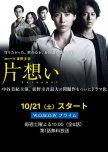
One of the motifs is a Möbius strip, which technically has both one and two sides, which is also why I think the correct English translation of Kataomoi should be the more literal One-sided Love (I think the title is meant to have a double meaning). The story does have many "unrequited love" situations, but that's not the theme—it's about much more than that, about loving more wholly and unconditionally in spite of not understanding every side of the other.
STORY
While the story is based on a Higashino Keigo mystery novel (for those who don't know, he's one of Japan's most popular writers), the tone of this series is not that of a detective/crime/investigation drama (although there are elements of investigation), but rather, a thoughtful relationship-focused friendship drama with a cloudy murder mystery plot that weaves together those relationships. It's relatively slow-paced compared to another kind of genre you normally see mysteries filmed as, but it's extremely compelling and could really be marathoned in one go if you had the time!
It's rather artfully filmed at points, including the end sequence of the first episode, as someone mentioned. I almost feel this could have been a better feature film with a higher budget, but it's really well-made and was the perfect length for the story at six episodes.
As for all the hand-wringing about how they'd handle transgender identity issues, it's done in a sensitive and compassionate way without being maudlin or overkill like you might expect from Hollywood. Honestly, I wasn't surprised at that at all, but I did find it refreshing and insightful without being preachy or telling audience members how to think. While it's a huge part of the story and is discussed at length, it isn't The story. There is the mystery, but the story is ultimately about friendship, and each character is wrestling with many questions about relationships in their own way.
What some viewers may take more issue with is the ending, but in context I found it satisfying. It's certainly very Japanese in its embracing the ambiguity of many technically explosive moral situations, and recognizing sacrifice as part of love. Okay, I just made some sweeping generalizations there, and it may come off as a judgment/rationalization of those situations, but it's not, at all. I just wanted to mention these things, as I sometimes feel like certain elements of many J-dramas get a bad rap because they're seen through a different cultural lens...
CAST/ACTING
The casting is great, as all the team members featured in past and future are totally believable both at age 20 and in their mid-late 30s, even though some of the actors are pushing 40 or over. (Miki is even shockingly convincing as a high school-aged Mitsuki in one brief scene! And not just because her make-up artist was great!) The three main actors (the Nishiwaki 'couple' and Mitsuki) showed a huge range and a depth of emotion that gave me the sense they truly put their all into their characters. While Kuninaka Ryoko plays a role similar to others she's done [the emotionally complex wife who looks sweet but is tough], it's because she's so good at it. She plays off of both Kenta and Miki's characters wonderfully and somehow makes the weird tension (that isn't even what we'd think) actually believable.
REWATCH?
I'm not an avid rewatcher at all, especially when it comes to a story with a mystery plot, so normally I can't figure out a score for this! However, I think Kataomoi's rewatch value is high as you'd likely be able to better appreciate some of the great little symbolic touches, as well as the psychological aspects of what characters are going through at various times (that were initially more of a mystery). Most of all, probably Kenta's role as it's a subtle emotional character arc that only becomes more meaningful later in the story. On the other hand, this is a story that stays with you, so you'll probably still be thinking about it later and retroactively appreciate these things!
OST
Music was on-point as usual, with a great theme and emotive score. It almost never got sentimental or emotionally manipulative, but rather added complexity and mood. I feel like the end credits song has for sure been used before...if so, anyone remember what drama? I can't remember, but it's evocative and a perfect fit.
NOTE: For those wondering about the sex scene in the first episode, it isn't graphic/realistic but more atmospheric, is short, and serves a purpose. It's not jarring and you can see why it happens. But 'mature' is still a valid tag because the themes in this may not resonate for perhaps younger teens as the characters are nearing midlife and dealing with many of the emotional, relational, and identity issues of that age.
Considerați utilă această recenzie?
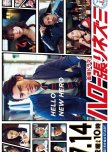
Hello Harinezumi
6 oamenii au considerat această recenzie utilă
STORY
I never read the manga, so I'm not sure how many story arcs were based on it, but the script was tight and had that perfect blend of (light) black humor, pop culture wit (and tons of riffing off old detective shows), parody and physical comedy to go along with sympathetic characters, intrigue, and heartwarming moments...which to me is a perfect sum of why this genre is such a pleasure to watch! I tend to be a poor judge of how much Japanese humor translates, but I think even people who don't catch all the cultural references (some are a bit subtle) would find the characters and situations entertaining.
The cases were diverse and unique, no matter how standard they were, thanks to the great characters and acting. The stories had heart, and were a really fun range, from family situations to a 50-year-old cold case, to matchmaking, to treasure hunting, to starring in a slapdash "hero show" play for kids. You won't see street fights or too many dead bodies (there are some, however!), but each case has just enough mystery to be compelling in itself, beyond the already compelling character and relational arcs. While it's episodic, as usual there is a definite progression that makes the whole season feel very satisfying and complete, even if you don't know all the characters' backgrounds and there's no unifying thread. Still, you can't help but want more when you get the end! And happily, it seems like there's going to be a season 2, which is a huge detective show triumph! Really hope it happens.
CAST/ACTING
As for the actors, you can't go wrong with Eita and Morita Go, who are both hilarious in their roles as quirky partners who both characterize the agency's motto—to be "compassionate and meddlesome." They had great relational and chemistry with Yamaguchi Tomoko as their boss, who I wasn't familiar with and was surprised to find out how few roles she's taken over the past decades. While her character is the typical smart, tough-yet-caring, independent middle aged single female boss (and I must say, I always love those characters), her zanyness is refreshing (she's always nursing some new drink, treats her employees like bros). She has major flair, and Yamaguchi pulls off her character perfectly.
Fukuda Kyoko's character...not so much. She almost always had on one of two botoxy kawaii-puzzled expressions, and her general over-selfconscious aren't-I-pretty aura made it hard for me to warm up to her somewhat generic and distracting character. I've liked her in a few roles that forced her to be a little more complex (e.g. Second Love), but she tends to not have much range, and in that sense I think this was a casting error even if her character is a stock one. The contrast is just too stark, especially when someone with flair like Aoi Yu comes onto the scene and her interaction with Eita's character is just oh so interesting-fun that you wish she was a main character! However, eventually Ranko-chan becomes more useful to the team even if she's more of a foil, and I stopped being annoyed as the other characters somehow made her seem cooler. Nearly all the supporting and guest actors did fabulous jobs, and I felt each episode got better and better.
OST/REWATCH
I loved the music, which was one of my favorite detective show jazz soundtracks next to Take Five...thanks to RADWIMPS (eclectic band that is great with soundtracks)...and make sure you watch the end credits each time...especially in the last episode. Too fun. Even though I rarely rewatch dramas—and especially not anything mystery-related—I'll probably rewatch this one sometime in the future as it's such a feel-good drama. It definitely will go on my list of favorites!
Considerați utilă această recenzie?
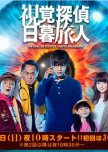
Shikaku Tantei Higurashi Tabito
5 oamenii au considerat această recenzie utilă
Această recenzie poate conține spoilere
This was one of the best-written (and executed) comedy dramas I've seen in a long time! If you saw the special that came out about a year ago, you know the premise of the story. For those who haven't, you do need to watch the special first--you can read the plot synopsis on that page. The correct translation of the title would have been Visual Detective Higurashi Tabito.I think what I loved most, besides the compelling plot that threaded through and built up with each episode, was the characters and their relationships. Each was so lovable and unique, even if some were technically stock characters. The casting was perfect in my opinion, and some of the best performances from many of the actors I've yet seen. And Sumida Moeno who played the amazing little Tei-chan was truly incredible in her first main role. The main characters, guest roles, and even the villains and purely comedic characters were multifaceted and had depth, and many of them had really emotionally satisfying character arcs. The relationships were fascinating, enjoyable, and dynamic, and I love how perfectly they fit into certain expected relationships while being totally unexpected at the same time. I also loved some of the societal issues they spoke to in subtle ways, both directly and indirectly; both through satire and serious, idiosyncratic character creation that I felt was a perfect connection between the original novel's author, the screenwriter, and the actors.
Also, the comedy was pitch perfect...in my eyes, at least! The combination of satire, gags, utter wittiness, physical comedy, riffing between actors, timing, and *even* post-production perfection had me rolling. I don't know if everyone would love it, as I grew up with Japanese humor and have realized more recently by way of international comments that sometimes I probably don't have the best awareness if everything is translating cross-culturally, or multi-lingually as well as I assume at first. Then I realize what I am taking for granted as normal or what is untranslatable or whatever, and realize what I think is hilarious may not be to more people than I think. But I *think* a lot of the basic humor would translate...and I even think a bunch of very subtle touches can be appreciated by international audiences, although there probably are many subtleties that might not, that I felt really added to the multilayered brilliance. Again, I may not be the best judge of this. I should probably mention that if you don't enjoy the quick juxtaposition of humor and very serious or even moments of dark drama (as I've noticed quite a few people saying they really don't like that aspect of many J-dramas), you might find parts of this a bit jarring.
As a J-drama genre, this is definitely a comedy and not a dark crime, detective, or police drama (I'm speaking of specific genres, as this includes all of those elements). So if you're a fan of those, don't expect those tonally, if that makes any sense. But I think anyone who enjoys those elements will appreciate the story. As for the mystery, while each of the early episodes has an episodic element, it also has the overall mystery of Tabito's backstory woven through in such a compelling way that not only isn't very predictable, but has a perfectly balanced sinister edge to it than never quite goes into truly disturbing territory and yet creates a unique kind of suspense.
As for his strange condition/ability, I don't want to throw in any potential spoilers, but I'll just say that it's best to suspend disbelief. Each episodic 'case' is satisfying and none are throw-aways. There is that awesome emotive quality to many of them that J-dramas in this genre do so well...touching without being maudlin. Main characters are developed through their interaction with the cases and their personal conflict also builds too. Lastly, for those who care, the romance element is really well done. It's paced just right and feels genuine. For those who are more of K-drama watchers, this is not like your typical K-drama crime comedy-romance (which I also enjoy), so don't expect that.
The music was perfect, imo, with the exception of the very short opening song. The composer got every mood just right, from the lovely string and piano themes to the jarring, discordant guitar when we get hints of the darkness roiling beneath the surface of the storyline. The songs are also great and not melodramatic. Rewatch value...I would definitely watch this again, it was so enjoyable, and I'm not a big rewatcher! But the mystery element is strong enough that a second watch would definitely not have anywhere near the same effect. Anyway, hope more people will take a chance on this drama! If you don't enjoy it as much as me, I imagine you'll find at least something enjoyable in it.
Considerați utilă această recenzie?
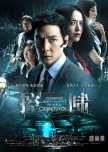
I enjoyed the tone set by the stylized cinematography (which utilized many CGI sets) and slightly futuristic setting. The CGI is for the most part creatively done, and gives the film so much more style--kind of a graphic novel feel (some have said it had a Sin City vibe). It could've been set in the present day too, but the slight upping of the CCTV world does make the plot more credible, even if still slightly fantastic. I'm sure Hollywood folks would criticize the technology/production design, but I actually liked how the futuristic setting wasn't distractingly overkill but instead felt subtle. There was actually something more realistic about a present world with some remodeling rather than a rebuilt world.
Acting was good; nothing hugely special, although Daniel Wu pulls off his multi-layered character quite deftly. I don't think I appreciated the nuances until I finished the movie. That said, rewatch value is highas a second watch will be a different experience thanks to the twists. The music was really well done--it fit the story and pacing and tone just right.
Considerați utilă această recenzie?
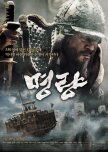
The Admiral: Roaring Currents
2 oamenii au considerat această recenzie utilă
STORY:
I felt like the downfall of what could've been truly an epic, emotive film were these two things: a seriously mediocre script and melodrama overkill. So I get that filmgoers would have already known the story from history, and I get that in some ways the first half of the script's very sparse storytelling decisions were somewhat typical of this genre for a well-known historical event. But I thought the script was such a waste for the most part, and not only messed up the pacing of the first half, but kept us from being fully invested in compelling character roles.
Here we have in the historical story such complex and rich conflict...but in the film, it hardly plays out in an emotive or visceral way, except for Admiral Yi's inner conflict (which Choi Min Shik did an admirable job showing with very little to work with in the script) and the too-few scenes with Im Joon Young and his wife. No one else's character is remotely developed, and sure, 2 hours isn't a lot of time, but it's plenty. With better writing that first half could have been so compelling instead of dragging like it did. As a result I just didn't feel as much as I should have. The stakes were high, but the storytelling didn't let me actually feel with the characters, and the few that had the potential just weren't capitalized on.
The themes had a ton of potential too. I did like that it went a bit further beyond the typical "stand and fight never bow down" thing (which I do think epic Korean historical films are great at doing in emotive ways). There was that, and it was fascinating to wonder what the admiral would think of next or how he would solve his next impossible problem of doom rather than give in like everyone wanted him to. And on that front, there were some nice plays on typical Art of War strategy ideas. I always enjoy that in war movies, where there's a subtle debate over the philosophy of a particular one. But I thought so much more could have been done with those themes, and so many small relationships and overall plot points that were totally ripe for development. That was disappointing...and ultimately why even the cool plot turns were just cool and not emotionally satisfying.
Instead, there was wayyyyyy too much time spent on melodrama overkill. So Korea does melodrama oh so well and I realize my personal taste has a pretty wobbly line that gets easily crossed. So if your tolerance is way high or you're Korean and super patriotic, you may love what I did not. But I found myself continuously pushed out of the story by the way too loooong shots of Choi Min Shik staring all heroically into the camera or to the side or the way too long slo-mo scenes of battle that actually made some of the otherwise good fight choreography look distracting/ridiculous [e.g. watch soldier stunt man unconvincingly get his brain bashed out with the same move for like 30 seconds instead of 3]. I should note, however, that the battle scenes were for the most part really well done considering how tough it must have been to direct in the studio. Kim Han Min really excels with action scenes.
That said, his War of the Arrows is proof that incredible action/cinematography/direction coupled with good writing goes so much further (he also directed and wrote that script). I don't know for sure, but I'm wondering if more of the script was written by co-writer Jun Chul Hong who also wrote Kundo: Age of the Rampant...another film with tons of potential but similar script flaws.
ACTING:
I was really let down by the acting too. Choi Min Shik was totally the best person for the role of the grizzled leader pressed against the wall, and I was impressed with what Ryu Seung Rong did with his character (the badass enemy Kurushima), who didn't have any interesting dialog but whose presence totally seethed. Otani Ryohei had little interesting dialog too, but had great presence, as did a couple other secondary officers I didn't totally recognize. Jin Goo (the scout) was so good in his few scenes, and his character interesting enough that I was sad we didn't really know who he was in spite of the heroic role he ends up playing on numerous levels.
And while normally I'm not too bothered by Korean actors playing Japanese characters with horrible Japanese accents (especially when it's only a small part of the story), I did not get the choices made here. I mean, there was a ton of Japanese dialog, and there are quite a few excellent Korean actors who speak excellent Japanese. I don't get why they cast Kim Myung Gon in a role many others could've played when he sounded soooo bad it was totally hilarious...and even the actors who were well cast (like Ryu Seung Rong and Cho Jin Woong) are very proficient speakers, and big names, their still-not-convincing accents were pretty distracting...I don't understand why they couldn't at least dub some of the more sub-standard lines in post production like the Chinese do for less-than-fluent second-language speakers? I realize not everyone cares, but sheesh, with such a high budget and so much Japanese dialog, why not do it right?? I mean, this film had a release in Japan, after all.
OST:
As others have said, the epic OST was on point. SO good! Emotional without being too melodramatic, and dramatic without being exhausting...and a great theme. One you'd want to listen to over and over. If anyone knows who the composer is and what other film scores they've done, I'd like to know.
REWATCH:
The naval battle direction in the second half was pretty great and worth rewatching. And if you're not familiar with the story, it's also worth rewatching so you can actually get what's going on in the first half, which can be slightly confusing as there's very little character introduction or set up.
Considerați utilă această recenzie?
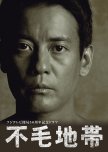
I felt sure I'd like it based on all those reasons and the rave reviews here, but it just felt like both the script and characters were missing something crucial. I was bored, I was annoyed, I kept waiting for it to get better...all things I didn't expect at all. So disappointing!!
For one, I couldn't feel invested in the characters, who should have been compelling based on the story elements (all of which were fictional, so it's not like they were just trying to keep things true to life). I mean, look at this cast! So many stellar, veteran actors, many of who have incredible chemistry in other dramas and films they've worked together in. But there's just no spark, anywhere. There were no fascinating characters, just a lot of stock characters.
The conflict was predictable, both within the family and business plots. And while yes, it might have been realistic that someone who had lived as a POW for 11 years would be expressionless and stilted, it just didn't work for a drama. Karasawa Toshiaki is an awesome actor, and he did what he could with his catatonic-faced character, but it got really old watching him march around like a wooden soldier expressing little emotion. His colleagues, many played by some of my favorite character actors, were beyond boring. No interesting schemers--just caricatures (and I both get and like Japanese stock characters, I should add)...and don't get me started on how some of these great actors were wasted. Some did the best they could, and some had shockingly bad performances. I don't blame them, though, as the dialog was terrible for the most part, and all in the context of very shallow relationships that never do much but skim the very surface. Just ugh.
The storytelling structure was similar to other Japanese TV historical-setting dramas, but it just didn't feel right for this story. The narration, time jumps back and forth, huge time skips...it just felt flat, and made Iki feel like an even more flat character. As for the plot, I was expecting brilliant strategy, chessboard intrigue, intellectual creativity the best serious business dramas have, but I just wasn't impressed by how they played out Iki's supposedly amazing strategies. There were no real twists or surprises, and I was only slightly emotionally invested at some points.
I did enjoy the idea of showing the progressive growth of the postwar economy through specific industries or trades, although I feel like this has been done better. The perspective on the war and post-war decades was super PC (as usual), but to me seemed to be going a little overboard with the melodramatic nationalism for a fictional story (whereas I can understand it for a biopic or something). I guess it can't be avoided for an anniversary-related drama as no major network is going to take any risks.
As the other reviewer said, the romance was a waste of time and annoying. It would've been far better without that arc even if it was part of the novel as it didn't really serve any purpose except to create some generic conflict. It served some purposes to push the plot, but that actually seemed more like contrived conflict. If it was taken out, it would've been more interesting to see how he worked out his family relationships and guilt. Overall motivations were very muddy and not fully convincing. Even the personal inner conflict Iki is dealing with feels flat and underexplored. Or maybe this was supposed to reflect the whole theme of "The Wasteland?" Not sure any medium but a novel could do this in a meaningful way.
OST was okay; some of the orchestration was typical melodramatic historical nationalistic music (ehhh); other themes were better; there was an interesting use of Western music (didn't get the closing Waltzing Matilda, but it did fit the mood). Mostly it fit the story and didn't distract, so that was a plus.
Considerați utilă această recenzie?






















